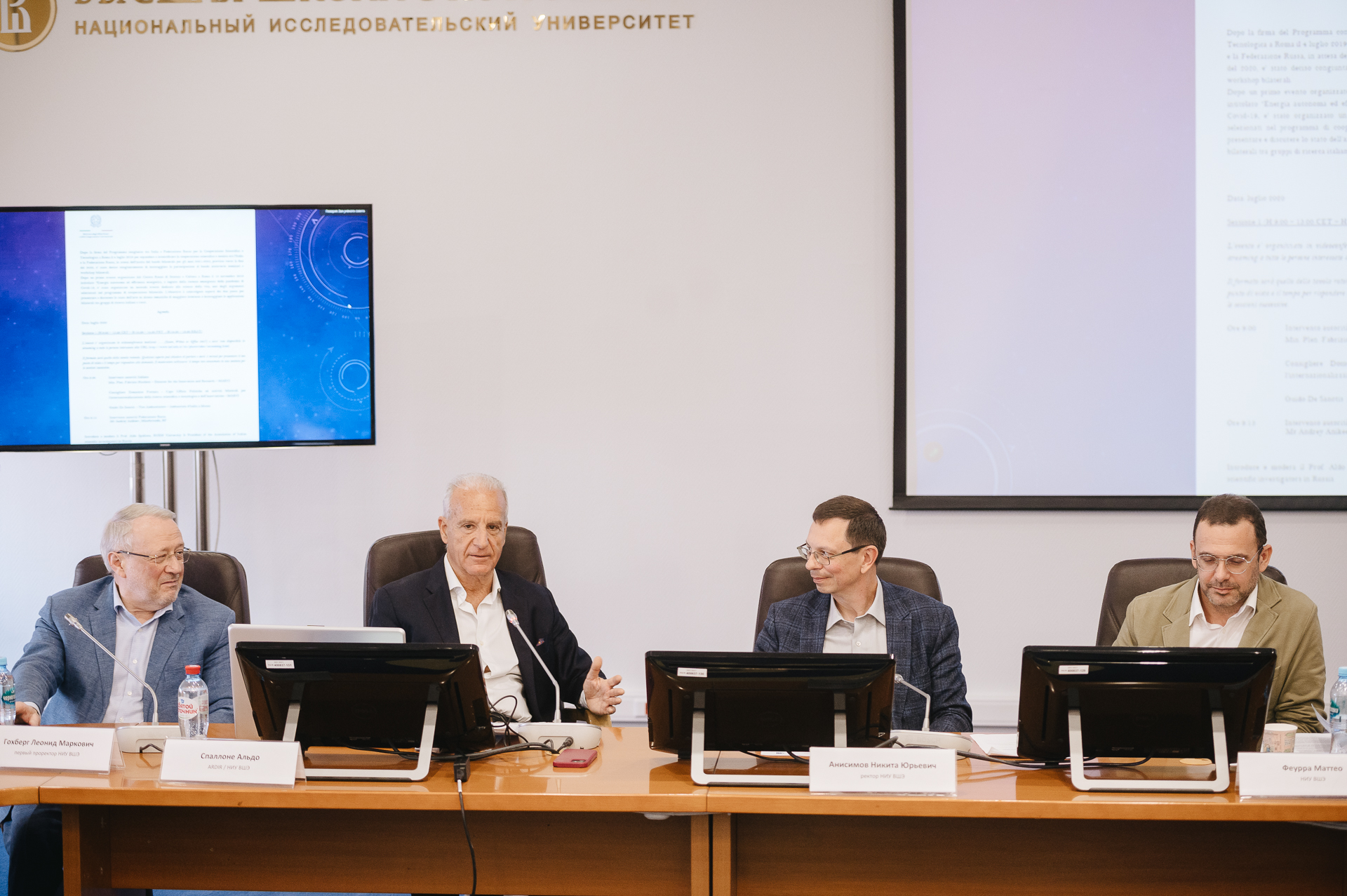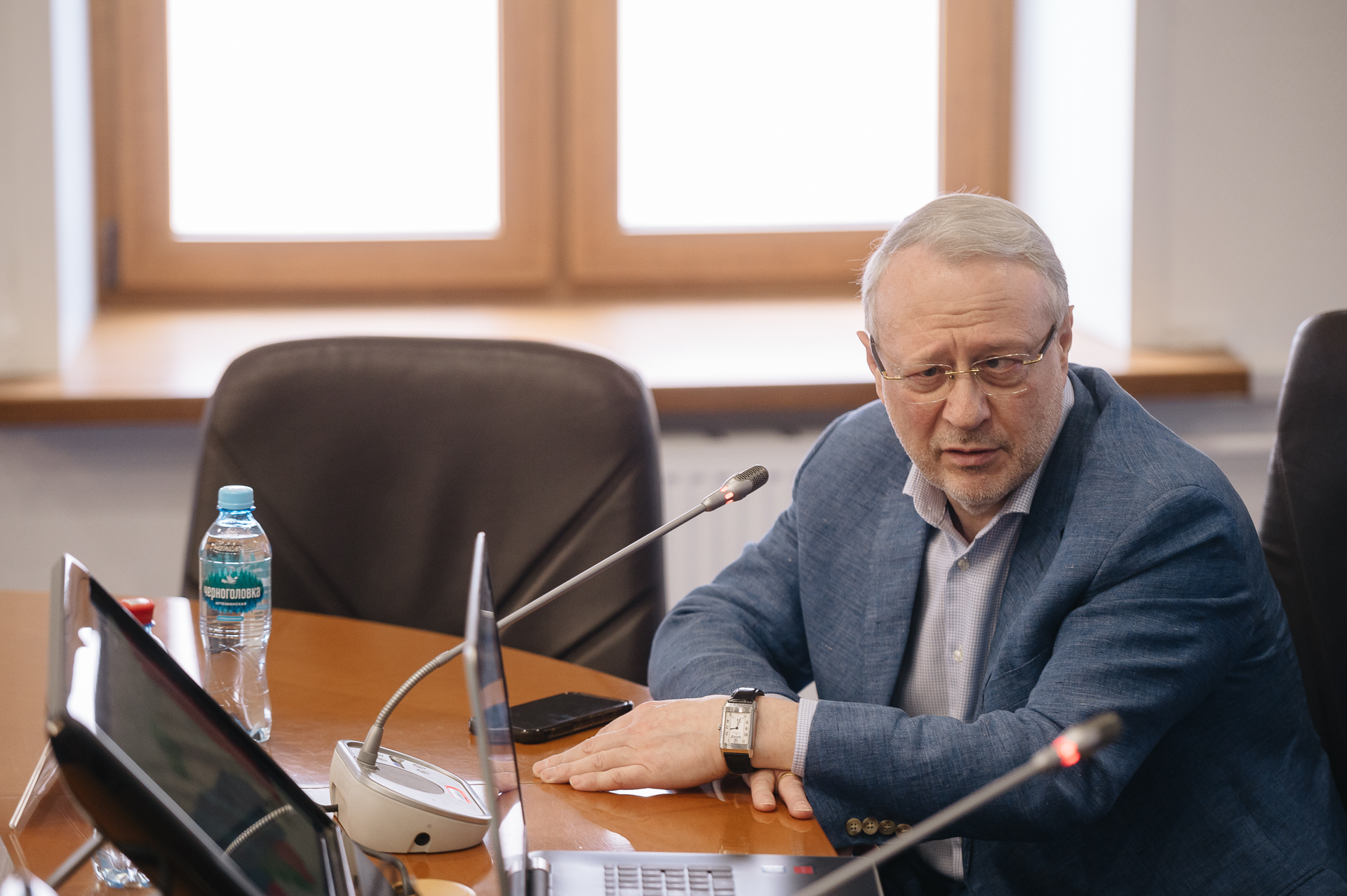Russian-Italian Projects in Biomedicine Discussed at HSE University
HSE University hosted an international mini-conference titled 'Search for new ways to develop Russian-Italian cooperation in the field of Biomedicine,' attended by scientists from both countries and HSE Rector Nikita Anisimov.
The international mini-conference ‘Search for new ways to develop Russian-Italian cooperation in the field of Biomedicine’ was co-organised by the Centre for Cognition and Decision Making of the HSE Institute for Cognitive Neuroscience and the Association of Italian Associate Professors in Russia (ARDIR). The conference was supported by the HSE Basic Research Programme and the Strategic Project 'Human Brain Resilience: Neurocognitive Technologies for Adaptation, Learning, Development and Rehabilitation in a Changing Environment' (ongoing in the framework of the Priority 2030 programme).
HSE University is open to cooperation with any international institutions, emphasised HSE Rector Nikita Anisimov in his opening remarks. 'We extend our invitation to prominent researchers, including early-career scientists from various countries. We can offer numerous opportunities for international cooperation, including “Human Brain Resilience,” a strategic project focused on neurocognitive technologies for adaptation, training, development, and rehabilitation, and implemented in the framework of Russia's Priority 2030 academic leadership programme. Today's event marks yet another step demonstrating our commitment to development, innovation, and collaboration,' he said.
Aldo Spallone, Research Fellow at the International Laboratory of Bioinformatics of the AI and Digital Science Institute, HSE University, spoke about the Association of Italian Associate Professors in Russia (ARDIR). The Association was established in 2020 upon the recommendation of the Italian Foreign Ministry and has had a positive impact on the relations between the two countries in the field of science.

Since the establishment of the Association, numerous prospective participants have shown interest in the opportunity to grow and develop alongside their Russian colleagues. This created a strong international connection, enabling scientists from both countries to share knowledge and expertise. Recent geopolitical events have caused many participants to take a break and reconsider their involvement in the organisation until better times. At the moment, we wish to inform all colleagues who are currently in Russia and carry out their work here that following a meeting with the Russian Ambassador to Italy (Alexey Paramonov - ed.), the Association will have the Russian authorities' support, allowing for more relevant cooperation with the world of science and higher education in Russia,' Aldo Spallone said.
HSE University positions itself as a global institution open to international scientific cooperation, stressed First Vice Rector Leonid Gokhberg. He noted, 'We are pleased that the Association has chosen our venue for today's seminar, and we look forward to continuing discussions here on our premises.'

The Russian-Italian conference continued with reports and presentations from participants. Anna Shestakova, Director of the HSE Institute for Cognitive Neuroscience, reported on the productive cooperation with Italian colleagues and also shared some of the results of her institute's work. As an example, she cited a recent study looking at how the choice of a foreign language can influence the learner's cognitive abilities. It has been found that languages dissimilar to one's native language stimulate cognitive function at the initial stage of learning, whereas those similar to the native language have a delayed effect, helping the learner's brain perform better once a higher level of foreign language proficiency has been achieved.
Matteo Feurra, Leading Research Fellow at the Institute for Cognitive Neuroscience, presented the project 'Improving Cognitive and Motor Function through Non-invasive Brain Stimulation.' The project involves Italian graduates of the Institute who continue their careers as scientists at HSE University.
Olga Buivolova, Research Fellow at the HSE Centre for Language and Brain, spoke about the activities of the Centre led by Professor Olga Dragoy. The areas of work carried out by the International Laboratory of Bioinformatics of the Institute of Artificial Intelligence and Digital Sciences were presented by Maria Poptsova, Head of the Laboratory. Ksenia Panidi, Senior Research Fellow at the Centre for Cognition and Decision Making, contributed to the discussion by highlighting the use of transcranial magnetic stimulation (TMS) in neuroeconomics research.
Prof. Jubin Abutalebi, MD, PhD, at the Centre for Neurolinguistics and Psycholinguistics (CNPL) of San Raffaele University, Italy, spoke about language control and about cooperation between Moscow and Milan.
Following the event, a round table was held to discuss the prospects for developing joint scientific projects involving scientists from both countries.
See also:
Neural Network Trained to Predict Crises in Russian Stock Market
Economists from HSE University have developed a neural network model that can predict the onset of a short-term stock market crisis with over 83% accuracy, one day in advance. The model performs well even on complex, imbalanced data and incorporates not only economic indicators but also investor sentiment. The paper by Tamara Teplova, Maksim Fayzulin, and Aleksei Kurkin from the Centre for Financial Research and Data Analytics at the HSE Faculty of Economic Sciences has been published in Socio-Economic Planning Sciences.
Larger Groups of Students Use AI More Effectively in Learning
Researchers at the Institute of Education and the Faculty of Economic Sciences at HSE University have studied what factors determine the success of student group projects when they are completed with the help of artificial intelligence (AI). Their findings suggest that, in addition to the knowledge level of the team members, the size of the group also plays a significant role—the larger it is, the more efficient the process becomes. The study was published in Innovations in Education and Teaching International.
Designing an Accurate Reading Skills Test: Why Parallel Texts are Important in Dyslexia Diagnosis
Researchers from the HSE Centre for Language and Brain have developed a tool for accurately assessing reading skills in adults with reading impairments. It can be used, for instance, before and after sessions with a language therapist. The tool includes two texts that differ in content but are equal in complexity: participants were observed to read them at the same speed, make a similar number of errors, and understand the content to the same degree. Such parallel texts will enable more accurate diagnosis of dyslexia and better monitoring of the effectiveness of interventions aimed at addressing it. The paper has been published in Educational Studies.
Intellectual Capital in the Face of Shocks: Russia and Iran Explore Internationalisation
In today's issue of Schola, Mariya Molodchik, Senior Research Fellow at the International Laboratory of Intangible-Driven Economy and Professor at the School of Economics and Finance at HSE University’s Campus in Perm, discusses a joint project with Iran University of Science and Technology, titled 'Internationalization of Companies from Developing Countries: The Role of Intellectual Resources in Response to Exogenous Shocks.'
HSE Researchers Introduce Novel Symmetry-Aware Neural Network Architecture
Researchers at the HSE Laboratory for Geometric Algebra and Applications have developed a new neural network architecture that can accelerate and streamline data analysis in physics, biology, and engineering. The scientists presented their solution on July 16 in Vancouver at ICML 2025, one of the world's leading conferences on machine learning. Both the paper and the source code are publicly available.
Students from HSE and Other Universities Carry Out Research Expedition at New Chersonesos
As part of the Rediscovering Russia student expedition programme, HSE University organised a research trip under the framework of the School for Young Humanities Scholars to the New Chersonesos museum and church complex in Sevastopol. The results of this expedition will form the basis for proposals on educational projects aimed at shaping young people’s historical memory of the role of Chersonesos, Crimea, and the Byzantine legacy in the history of Russian culture and statehood.
HSE Researchers Determine Frequency of Genetic Mutations in People with Pulmonary Hypertension
For the first time in Russia, a team of scientists and clinicians has conducted a large-scale genetic study of patients with pulmonary arterial hypertension. The team, which included researchers from the International Laboratory of Bioinformatics at the HSE Faculty of Computer Science, analysed the genomes of over a hundred patients and found that approximately one in ten carried pathogenic mutations in the BMPR2 gene, which is responsible for vascular growth. Three of these mutations were described for the first time. The study has been published in Respiratory Research.
First Caucasus School on Experimental Research and Cognitive Sciences Takes Places in Adygea
On September 17–20, 2025, the First Caucasus School on Experimental Research and Cognitive Sciences took place at the Gornaya Legenda venue of Adyghe State University (ASU). The event was organised by the ASU Experimental Linguistics Laboratory, the HSE Centre for Language and Brain, and the HSE Centre for Sociocultural and Ethnolinguistic Studies. The school brought together over 50 participants—students, doctoral candidates, and early-career researchers from across Russia, along with lecturers and speakers from France, Serbia, China, Turkey, Kazakhstan, and Uzbekistan.
HSE Scientists Reveal How Disrupted Brain Connectivity Affects Cognitive and Social Behaviour in Children with Autism
An international team of scientists, including researchers from the HSE Centre for Language and Brain, has for the first time studied the connectivity between the brain's sensorimotor and cognitive control networks in children with autism. Using fMRI data, the researchers found that connections within the cognitive control network (responsible for attention and inhibitory control) are weakened, while connections between this network and the sensorimotor network (responsible for movement and sensory processing) are, by contrast, excessively strong. These features manifest as difficulties in social interaction and behavioural regulation in children. The study has been published in Brain Imaging and Behavior.
Scientists Develop New Method to Detect Motor Disorders Using 3D Objects
Researchers at HSE University have developed a new methodological approach to studying motor planning and execution. By using 3D-printed objects and an infrared tracking system, they demonstrated that the brain initiates the planning process even before movement begins. This approach may eventually aid in the assessment and treatment of patients with neurodegenerative diseases such as Parkinson’s. The paper has been published in Frontiers in Human Neuroscience.


